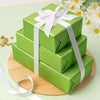
Gift Wrapping-Related Facts You Did Not Know
, by Amanda Melendez, 1 min reading time

, by Amanda Melendez, 1 min reading time
Gift wrapping is not a recent discovery; however, it serves as an ancient practice passed down from many different cultures around the globe.

Wrapping gifts and letters is a practice that humanity has now determined as tradition. Spanning from several cultures and ancient times, it even served different roles than it currently does. Here, we will explore and discuss gift wrapping-related facts you did not know to educate the world on the matter.
Starting in the second century BCE in China, the Southern Song dynasty first used paper to wrap envelopes known as chih pao. However, they sealed them for documents relayed through government officials. This is our first recorded use of envelopes and wrapping to date.
These early envelopes were not used as greeting cards until later when adopted by the Egyptians, who used papyrus to write their letters. These letters usually had some message of goodwill and to wish someone a happy new year. A similar practice used in Greece had the lighting of candles as an offering to the gods, which we now celebrate on our birthday cakes unknowingly.
In the first century BCE, wrapping packages and gifts protected them from the elements and trials of travel. This is seen in Japanese and Korean cultures through the furoshiki and bogaji, respectively. Furoshiki and bogaji were fine cloth wrapped items tied in chords, like our gift wrap ribbon, to protect gifts and packages on their journeys.
Most modern wrapping paper is wasteful, as it takes several hundred trees to produce a few crates of non-renewable paper. This means that you cannot recycle them due to their chemical structure and because they are not organic. Nearly three million dollars are spent annually on gift wrapping paper, making almost four tons of waste.
Perhaps the world can make a move back to the more traditional cloth fabric wrapping that is reusable, year after year, for a lifetime. With the world today, we need to do all that we can to take care of our planet. Hopefully, these gift wrapping facts that you did not know enlightened your mind and opened your eyes.


